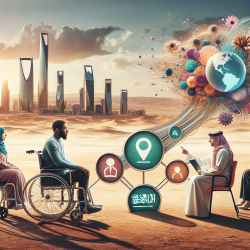Introduction
In recent years, the influx of resettled refugee youth into the U.S. has highlighted the critical role schools play in supporting their mental health and psychosocial wellbeing. A recent study titled "Supporting mental health and psychosocial wellbeing through social and emotional learning: A participatory study of conflict-affected youth resettled to the U.S." provides valuable insights into how schools can better serve these students. This blog explores how practitioners can implement the findings of this research to improve outcomes for resettled youth.
The Importance of Social and Emotional Learning (SEL)
Social and Emotional Learning (SEL) has gained traction as a vital framework for supporting the adjustment of resettled refugee youth. The conventional SEL model, however, often falls short in addressing the unique needs of historically marginalized groups, including immigrants. The study suggests a transformative SEL approach, which incorporates cultural responsiveness and addresses the specific challenges faced by resettled youth, can significantly enhance their wellbeing.
Key Findings from the Study
- Language Acquisition: Enhancing English language skills was identified as a crucial factor in building confidence and fostering a positive self-image among resettled youth.
- Peer Support: Developing supportive peer relationships was highlighted as essential for creating a sense of belonging and facilitating acculturation.
- Adult SEL: Educators play a pivotal role in promoting psychosocial wellbeing by providing culturally responsive support and fostering inclusive learning environments.
- School Climate: A welcoming school climate, characterized by orientation to rules and norms and cultural inclusivity, was deemed vital for the successful adjustment of newcomer students.
Implementing Transformative SEL
Practitioners can leverage the study's findings by adopting a transformative SEL approach that emphasizes cultural responsiveness and inclusion. Key strategies include:
- Providing targeted English language support to enhance communication skills and boost confidence.
- Facilitating peer mentorship programs to foster supportive relationships among students.
- Training educators in cultural responsiveness to better support the unique needs of resettled youth.
- Implementing schoolwide initiatives that promote a welcoming climate and celebrate cultural diversity.
Conclusion
The study underscores the importance of adapting SEL frameworks to better serve resettled youth from conflict-affected regions. By incorporating transformative SEL strategies, practitioners can create more inclusive and supportive educational environments, ultimately enhancing the mental health and psychosocial wellbeing of these students.
To read the original research paper, please follow this link: Supporting mental health and psychosocial wellbeing through social and emotional learning: A participatory study of conflict-affected youth resettled to the U.S.










